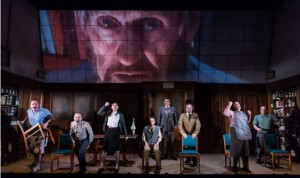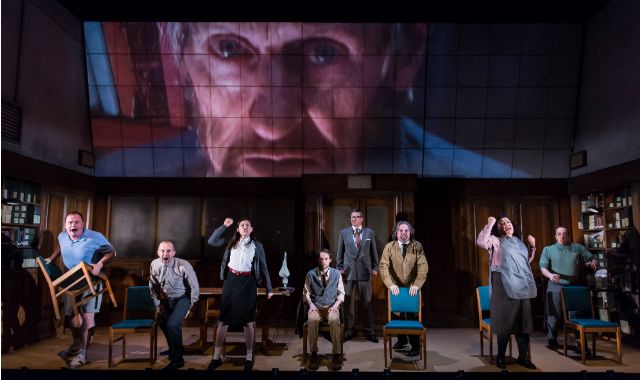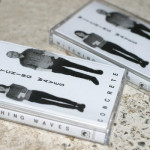
Several years ago I took in a theatre adaptation of a great Orwellian novel; Animal Farm it’s title, an allegory for Communist Russia during the times of Lenin and Trotsky, and notable prose on the topic. However, the theatre was not effective at highlighting the underlying foci of the novel, leaving many in the audience that had not indulged in Orwell’s political journalism and fictional prose seemingly somewhat baffled about what they had just witnessed.
As I was sat in the Almeida, after the information that the show lasts one hour and forty minutes, with no interval, remorsefully I had the fear that my Animal Farm experience had induced. Formatting Nineteen Eighty-Four to sell to a theatre audience might just as easily mean a detachment from the political grievances and interesting leitmotifs. Animal Farm always felt more like it was set up for theatre, certainly creating an amazing opportunity to disturb and animatedly shock its audience. Nineteen Eighty-Four given a theatrical turn to me seems more complex with the various notions that it forces the reader to consider, of the state being the enemy of the citizen, shattering the romantic ideas of feeling overcoming all. However, the theatre programme was vehemently correct in exclaiming the loyalty to the novel, and I am sure that this adaptation would add no supplementary suffering to a prolific author who sadly departed our parchment through tuberculosis.
Narration sets the initial scene, allowing Orwell’s lucid description to permeate the boundaries from novel to set, a relief to my ears. Sounds of discord fill up the room, the emotive screams and visual aids make the two-minute hate intolerable, a grotesque heightening of discomfort overwhelming the theatre.
Violating the senses, which actually saw at least the older generation (and myself) squirm and often turn away from the stage during the scenes of torture, I could not help but allow my mind to meander and confirm that this same cast and crew would work a marvel on Anthony Burgess’ A Clockwork Orange. Aside from these thoughts of other theatre adaptations, I can say that, non-too technically, left with a profound effect I was.
Headlong collaborating with the Almeida Theatre and Nottingham Playhouse conclude an arresting trilogy of productions with this impactful, disturbing, dynamic and yet, salubrious rendition of a highly influential tome. The adaptation, created by Robert Icke and Duncan Macmillan, began its run at the Almeida in February; predictably a sell-out show.
The realisation, fusing video design with theatre design is one that thwarts the viewer, engaging with them on several formats, culminating the audience’s general unease. Working with Chloe Lamford, Natasha Chivers and Rupert Goold, we are subjected to harsh lighting, fantastically resourceful, colourful, yet timely sets as well as this interjection of technology permeating the traditional theatre set.
There is a significantly contemporary approach to this adaptation, despite its loyalty to the text. This is perhaps the only area in which the adaptation disappoints the audience, not making the flash-forwards entirely blatant but also not hitting the key surveillance issues in this section set in the future. There is a mere hinting with the scene where they all pull out their phones, reminding me of an Orwell Prize Award’s Ceremony at which I posed the question on Orwell’s thoughts on the iPad.
The cast effectively recreate the youthful feelings I recall holding for these characters within the book, reading it more than ten years previous. The deplorable loathing towards Julia and disdainful pathos for Winston Smith all came flooding back, and to which I cannot criticise the cast or direction.
Julia’s fervent sexual prowess Hara Yannas evokes with finesse, and Mark Arends loosely holds onto Orwell’s portrayal of Winston, although a little too meek in my opinion with a tendency to display the fragile vulnerability a little too often in my eyes. However, as aforementioned, they both ignite the same feeling I held for the two reading the book more than a decade ago.
Notably, one performance that sent a genuine chill down my spine was that by Sylvie Gillard, who plays Parsons’ daughter. Her repetitive, seemingly sincere portrayal of this conformist character, who albeit so young is one to ardently antagonise throughout the novel, is frankly astounding, causing unease. Acknowledging that this is Gillard’s first professional engagement, we can only expect great things from this young member of the Young Actors Theatre.
Despite the hundred minutes of sensory torment, crafting viewer agitation, I am left a little dissatisfied by the scenes set in the future, which merely hint at the Orwellian truth in what seems to be 2015. On the other hand, the inevitable questions which these scenes spark can only ensure that the Almeida, Headlong and Nottingham Playhouse inspire a pondering departing playhouse.




